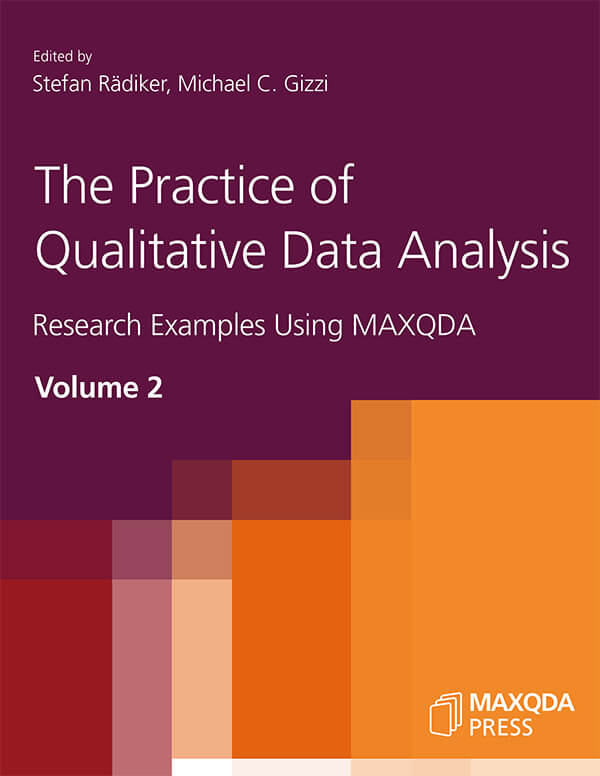The Practice of Qualitative Data Analysis
Research Examples Using MAXQDA, Volume 2

- Editors: Stefan Rädiker, Michael C. Gizzi
- Pages: 179
- Released: February 23, 2024
- Language: English
- ISBN: 978-3-948768188
- DOI: 10.36192/978-3-948768188
Introduction (pp. 13–15)
Stefan Rädiker & Michael C. Gizzi1.
Using MAXQDA’s Word-Based Features and AI Assist: Processing Large Numbers of Documents in Strategic Foresight (17–31)
Matthew H. Loxton2.
Using MAXQDA for Word-based Content Analysis: Nature and Climate Change Perceptions in Qualitative Interviews (33–48)
Leandro Mahalem de Lima3.
Using MAXQDA for Dictionary-Based Content Analysis: An Example Exploring the Business Strategy of Netflix Over Time (49–70)
Richard L. Vail & Michael C. Gizzi4.
Using MAXQDA’s Code Comments for Rapid Analysis: Writing Summaries for Analyzing and Reporting in Evaluation (71–86)
Stefan Rädiker5.
Using MAXQDA to Analyze Open-Ended Survey Responses: An Example From an Evaluation Project (87–106)
Christina Silver6.
Using MAXQDA for Mixed Methods Research: An Example Integrating Interview, Survey, and Social Network Data (107–126)
Sinem Toraman Turk7.
Using MAXQDA for a Large Qualitative Dataset: Identifying Relevant Data and Analyzing It With Thematic Analysis (127–147)
Christian Schmieder & Allison Rogers8.
Using MAXQDA for Combining Visual and Textual Analysis: An Example From a Participatory Photovoice Research Project (149–164)
Elena Samonova9.
Using MAXQDA for Interpretative Analysis: Analyzing Four Interviews (Almost) Without Coding (165–179)
Andreas Müller
This book is a companion to the first volume of The Practice of Qualitative Data Analysis published in 2021. Volume 2 provides an additional nine case studies of real-world examples that illustrate how MAXQDA is used in actual research projects. Each chapter is organized to walk the reader through the research example, beginning with an introduction to the topic, a discussion of data collection and methodological approach, and a step-by-step description of how they used MAXQDA from start to finish, gaining insights into both efficient ways to use MAXQDA and innovative approaches they might not be aware of.
Readers can benefit from this book in several ways:
• Get inspirations and solutions for their own projects
• Learn more about innovative methodological approaches
• Avoid pitfalls by learning from the lessons offered by the authors at the end of each chapter
• Draw insights from more than 120 screenshots that illustrate qualitative research in practice
Audience:
• All researchers who want to get to learn the potential of qualitative data analysis with MAXQDA
• All MAXQDA users who want to expand their knowledge and skills, regardless of whether they are novices or experts
Dr. Stefan Rädiker
Dr. Stefan Rädiker is a consultant and trainer for research methods and evaluation and has worked with MAXQDA for more than 20 years. He supports the VERBI team in the further development of MAXQDA and has (co-)authored many textbooks and guides on research methods, including Focused Analysis of Qualitative Interviews with MAXQDA (2020) and Doing Grounded Theory with MAXQDA (2023).
www.methoden-expertise.deDr. Michael C. Gizzi
Dr. Michael C. Gizzi is a professor of criminal justice at Illinois State University. He holds a doctorate in political science. His research is on qualitative and mixed methods approaches to judicial process and constitutional law. He is a certified MAXQDA trainer and consultant and offers numerous workshops and webinars on using MAXQDA in qualitative research and teaching.
www.4stagesofresearch.com